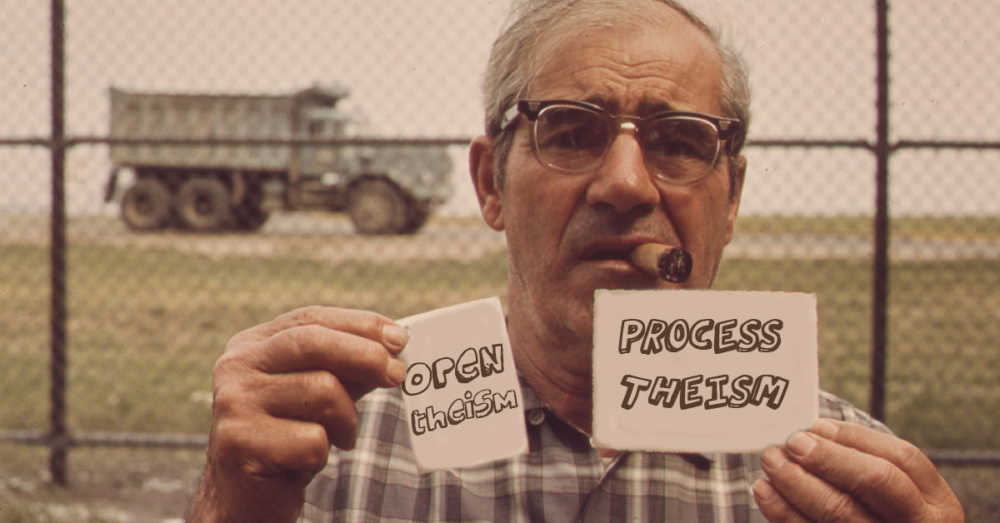We run our website the way we wished the whole internet worked: we provide high quality original content with no ads. We are funded solely by your direct support. Please consider supporting this project.

Process Theology & Open Theism: What’s the Difference?
Question: When ReKnew talks about Open Theism is it a mistake for people to equate it with Process theology, and if so what are the defining differences?
I guess I am starting to lean toward Dr. Boyd’s thoughts for all things theologically egg-heady, so I thought I would ask the question. Your ministry has been freeing for me, and has helped to save my faith after my son had cancer. I only joke because I feel very close to you guys even though we have only met in passing in a very crowded coffee shop and after a couple of sermons that hit me so hard I was at a loss for words.
Answer: Thanks for the kind words of affirmation. I wrote my doctoral dissertation on Process thought (Trinity and Process) where I critiqued the metaphysics of Charles Hartshorne and tried to demonstrate that one can adopt a system that has all the explanatory power of Process Thought (PT) without its unorthodox implications. The unorthodox implications are these.
- In PT, God exists eternally in relation to a non-divine world. So PT denies “creation ex nihilo”
- In PT, God is bound to metaphysical principles that govern both God and the world. So God isn’t able to really interact with the world as a personal being. God must always, of necessity, respond in ways that the metaphysics of the system stipulate. This means…
- In PT God can’t intervene in unique ways, like personally answering prayer
- In PT God can’t intervene and perform miracles
- In PT God can’t become uniquely embodied, as he is in Christ.
These are pretty serious shortcomings. I hope it’s clear that PT has got little in common with Open Theism other than that we both believe the future is partly comprised of possibilities. But even here there is a major difference. In Open Theism, God chooses to create a world with an open future, while in PT God has created of necessity.
I am very concerned that so many progressive thinking evangelicals are flirting with Process Thought. It’s really not a friendly home for anything like orthodox Christianity. While many find the dynamic and relational ontology of process thought, compelling—I can see how this is attractive— the intrinsic nature of the system is hostile to the Christian faith.
If you want to go deeper on this topic, my book Trinity and Process seeks to clarify all that’s positive with PT while avoiding all that’s negative. For a succinct summary of some of the shortcomings of PT, see chapter 9 in my book Satan and the Problem of Evil.
Category: Q&A
Tags: Open Theism, Process Theology, Q&A
Topics: Open Theism What it is and is not
Related Reading

What is the significance of Numbers 14:11?
In the light of the Israelites’ relentless complaining the Lord says to Moses, “How long will this people despise me? And how long will they refuse to believe in me, in spite of all the signs that I have done among them?” The fact that the Lord continued, for centuries, to try to get the…

How do you respond to Galatians 1:15–16?
“…when God, who had set me apart before I was born and called me through his grace, was pleased to reveal his Son to me…I did not confer with any human being…” As with Jeremiah (Jer. 1:5), John the Baptist (Luke 1:13–17) and other God-ordained prophets, Paul was aware that God had decided on a…

Terror in the Night
I’ll never forget the night it first happened to me. I was thirteen, sharing a bedroom with my older brother. I woke up in the middle of the night and felt as if something was pinning me to the bed, choking me, and electrocuting me, all at the same time. The wind was blowing through…

How do you respond to Acts 4:27–28?
“[B]oth Herod and Pontius Pilate, with the Gentiles and the peoples of Israel, gathered together against your holy servant Jesus, whom you anointed, to do whatever your hand and your plan had predestined to take place.” This passage is very close in content to Acts 2:23 (see How do you respond to Acts 2:23?). While…

Is homosexuality a sin?
There are three passages in the Old Testament (Gen. 19: 1-13; Lev 18:22; 20:13) and three in the New Testament (Rom. 1:26-27; 1 Corinthians 6:9-10; I Tim. 1:10) that have traditionally been read as prohibiting homosexuality. On top of this, the entire biblical narrative presupposes that sex is supposed to take place between a man…

Greg on the Open View of the Future
Greg was featured today on the Pangea blog. (Thanks Kurt!) The blog references a series of lectures Greg presented at the Open Theology and Science Conference at Azusa Pacific University, April 11, 2008 entitled “A Flexible Sovereignty: A Biblical Understanding of Providence and the Nature of the Future” . If you’re looking for a comprehensive video series on…
